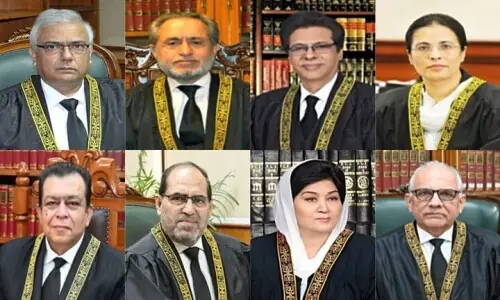Islamabad:
In a landmark procedural decision, an eight-judge Constitutional Bench (CB) of the Supreme Court of Pakistan on Tuesday approved requests seeking the live streaming of proceedings concerning challenges to the 26th Constitutional Amendment. The amendment, which was passed last October, has been a contentious subject, drawing significant scrutiny from legal experts and opposition parties concerned about its impact on judicial autonomy.
The amendment, among other changes, stripped the Supreme Court of its suo motu powers, set the Chief Justice of Pakistan’s (CJP) term at three years, and empowered the Prime Minister to appoint the next CJP. Ironically, the very legislation paved the way for the formation of the Constitutional Bench that is now scrutinizing its legality.
The bench, headed by Justice Aminuddin Khan, resumed hearing a set of pleas filed by various high court bar associations and the PTI.
Clash of Rights: Public Access vs. Judicial Prudence
During today’s hearing, the primary points of discussion included requests for a Full Court to hear the petitions, objections to the current CB’s formation, and the demand for transparency via live streaming.
At the outset, the bench was cautious about the live broadcast request. However, lawyer Khawaja Ahmad Hassan pressed the issue, arguing that the public must be made aware of the grounds for requesting a Full Court hearing. Barrister Salahuddin Ahmed then forcefully contended that every citizen has the right to information, recalling that the 26th Amendment was approved by Parliament “in the darkness of the night.”
“The Amendment was passed in the darkness of the night. That is why facts must be revealed to the public,” Ahmed stated, arguing that the proceedings should at least be live-streamed for public viewing in what he termed the “constitutional case of the century.”
Justice Naeem Akhtar Afghan noted the gravity of the request, asking Ahmed, “So you want that apart from the proceedings taking place in broad daylight, they should also be live-streamed?”
Court Decision and Judicial Independence
The bench reserved its decision on the live streaming requests before later announcing its approval—a significant victory for transparency advocates. The court then adjourned the hearing until tomorrow (Wednesday) at 11:30 am.
Earlier, the bench consulted the government’s stance. Additional Attorney General Amir Rehman classified the matter as “administrative,” leading Justice Muhammad Ali Mazhar to ask, “So you will agree with whatever the bench decides?”
The petitioners have asked the apex court to strike down the entire 26th Amendment on grounds of procedural impropriety or, alternatively, to strike down provisions that substantively undermine judicial independence, particularly those related to the appointment of the CJP and the formation of constitutional benches.
The controversy is heightened by recent internal correspondence, including a joint letter from senior judges that criticized the Chief Justice of Pakistan’s previous decision to disregard a committee’s proposal to bring the challenges before the Full Court, observing that a “golden opportunity” to decide the matter collectively may have been “lost, perhaps irretrievably.” The court’s decision to live stream the proceedings will now ensure unprecedented public visibility for this pivotal constitutional debate.



